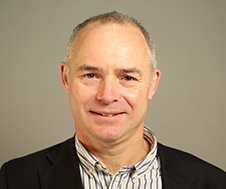 Friday 23 February 2018 4:20pm
Friday 23 February 2018 4:20pm
Prisoners wanting to continue being smoke-free on release from prison are finding a lack of support, University of Otago research has found. Image: Creative Commons.
A lack of support means many prisoners relapse back to smoking on release, despite many wanting to stay smokefree, a new study has found.
The pilot study by a team of medical students at the University of Otago, Wellington was published today in the New Zealand Medical Journal.

Professor Richard Edwards, Department of Public Health, University of Otago, Wellington.
“The findings of this study are in line with international research, which shows that relapse rates are very high when prisoners leave smokefree prisons,” says Professor Richard Edwards, from the Department of Public Health at the University, who conceived the study and supervised the student researchers.
Professor Edwards says that in health terms, prisoners are a very vulnerable group, and with the introduction of Smokefree Prisons in 2011, there is a real opportunity to help people quit smoking long term, bringing health and financial benefits to them and their families.
“We wanted to find out what happened to smokers during and after prison – whether they quit whilst in prison and managed to stay smokefree afterwards,” says Professor Edwards.
“This study was small in scale, but it threw up some interesting findings that are worthy of more in-depth exploration,” he says.
With support from the Salvation Army, the students surveyed recently released prisoners and professionals who work with them to better understand experiences about remaining smokefree once out of prison.

Sarah Twine, 5th Year medical student, University of Otago, Wellington.
“Recently released prisoners told us that staying smokefree was difficult when returning to social settings where smoking was common,” says Sarah Twine, who is a medical student at the University of Otago, Wellington. “For some, the stress of reintegration also seemed to be a factor.”
“Re-integration staff said their services were focused primarily on preventing recidivism, and therefore helping prisoners stay smokefree after re-entering the community was not seen as a high priority” says Ms Twine, who led the study.
“However many were open to thinking about how they and their services might help.”
“The findings suggest that this opportunity is being missed, and that potentially there is much more that Corrections and community-based reintegration providers could be doing to support prisoners who want to quit,” says Professor Edwards.
Salvation Army Reintegration Services National Manager Glen Buckner says the findings are helpful for his staff in their work.
“We try and motivate the people we work with towards a healthy lifestyle and work with them to make those changes. Studies like this provide useful information for us to do that,” Glen Buckner says.
For further information contact:
Professor Richard Edwards
Department of Public Health
University of Otago, Wellington
Email richard.edwards@otago.ac.nz
Sarah Twine
5th Year Medical Student, University of Otago, Wellington
A list of Otago experts available for media comment is available elsewhere on this website.
Electronic addresses (including email accounts, instant messaging services, or telephone accounts) published on this page are for the sole purpose of contact with the individuals concerned, in their capacity as officers, employees or students of the University of Otago, or their respective organisation. Publication of any such electronic address is not to be taken as consent to receive unsolicited commercial electronic messages by the address holder.